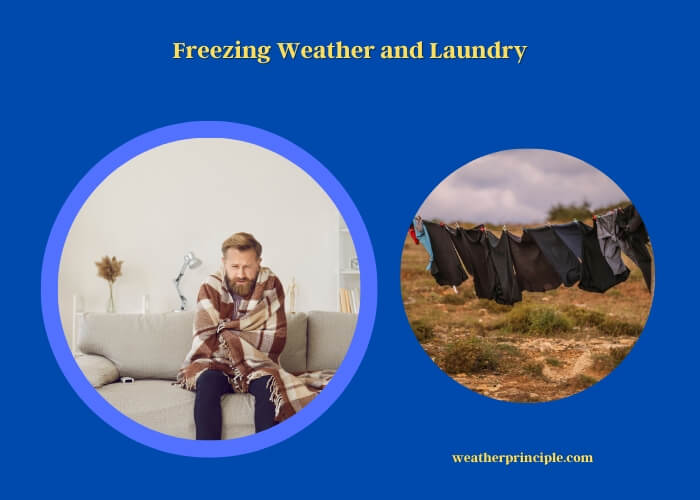Published on: August 12, 2023
Written by Shaown Khan / Fact-checked by Kader Khan
Yes, it is okay to do laundry in freezing weather, but potential problems with the water supply and machine operation should be considered.
Freezing weather can cause issues with laundry routines. One main issue is the potential for water supply lines, particularly hoses, to freeze. This can obstruct the water flow to the washing machine, hampering the laundry process. Proper insulation can help prevent this problem, ensuring a steady water supply even during freezing conditions.
A noteworthy point relates to the temperature of the water. Cold water needs to be at least 60 degrees Fahrenheit to fully dissolve most laundry detergents. In winter, the water may not reach this temperature. Consequently, laundry detergents may not dissolve fully, compromising the cleaning power. Thus, the effectiveness of your laundry process may be decreased.

In the event of extremely low temperatures, there’s also the risk of water expanding inside the pipes which could potentially cause a burst. Hence, it’s crucial to ensure your plumbing system is well maintained and prepared for such situations. In conclusion, while it’s possible to do laundry in freezing weather, certain precautions should be taken into account for optimal results.
Is It Ok to Do Laundry in Freezing Weather?
As winter approaches and temperatures plunge, a question arises for many: Is it ok to do laundry in freezing weather? This article will provide insights into the challenges and solutions associated with winter laundry.
The Relationship between Laundry and Temperature
The Role of Heat in Laundry
The temperature of the water in your washing machine directly influences the cleaning process. Heat increases molecular motion, helping to break down oils and dirt. Warm water also allows laundry detergents to work more effectively.
Cold Weather’s Influence on Laundry Process
Cold weather can severely impact the laundry process. Temperatures below 60 degrees Fahrenheit can inhibit the ability of detergents to work efficiently, leaving your clothes less clean than they should be.
Challenges of Doing Laundry in Freezing Weather
Cold Weather Impact on Laundry Detergents
Most laundry detergents are designed to work best at temperatures above 60 degrees Fahrenheit. At lower temperatures, these detergents fail to dissolve completely, reducing their effectiveness and leaving residue on your clothes.
Subpar Cleaning Results due to Low Temperatures
The cold impedes the capacity of detergents to remove dirt and oils from clothing. Consequently, clothes washed in freezing temperatures may not be as clean as those washed in warmer conditions.
The Effect of Cold Temperatures on Various Fabric Types
Different fabrics react differently to cold temperatures. Some may become rigid and brittle, while others may retain moisture, promoting the growth of mold and mildew.
Comparison of Laundry Results in Different Temperatures
| Temperature | Cleaning Efficiency | Impact on Fabrics |
| High (Above 120°F) | High | Potential shrinkage or color fading |
| Medium (60°F – 120°F) | Medium to High | Little to no impact |
| Low (Below 60°F) | Low | Potential moisture retention |
The Impact on Washing Machines
Cold Weather’s Influence on Washing Machine Performance
Freezing temperatures can affect the performance of washing machines. Components may freeze or malfunction, leading to costly repairs or replacement.
Measures to Minimize Damage: Cold Weather Laundry
You can protect your washing machine from cold weather damage by insulating it, ensuring it is drained after each use, and storing it in a warm location if possible.
Techniques to Protect Washing Machines in Cold Weather
| Technique | Description |
| Insulation | Insulate the pipes and the machine itself. |
| Draining | Drain the machine after each use to prevent water from freezing inside. |
| Warm storage | Store the machine in a heated location, if possible. |
Solutions for Winter Laundry
Preparations for Laundry in Winter
There are several steps you can take to prepare for winter laundry. This includes stocking up on cold-weather detergents, planning to dry clothes indoors, and protecting your washing machine.
Detergents Suitable for Cold Weather
Some detergents are specially formulated to work in cold water. These products can provide good cleaning results even in freezing temperatures.
Indoor Drying Options for Frozen Outdoor Lines
If outdoor clotheslines are frozen, you can dry clothes indoors using drying racks, clotheslines, or dryers. Be aware that indoor drying can increase humidity levels in your home.
Pros and Cons of Various Indoor Drying Methods
| Drying Method | Pros | Cons |
| Drying rack | Affordable, portable, easy to use | May take longer to dry clothes |
| Indoor clothesline | Can hold large loads, inexpensive | Installation required, space-consuming |
| Dryer | Fast, convenient | Expensive, uses a lot of energy |
Environmental Factors
Comparing Energy Usage: Hot Vs Cold Water Laundry
Doing laundry in cold water uses less energy than hot water, contributing to a smaller carbon footprint. Yet, it’s worth noting that with freezing temperatures, the effectiveness of cleaning diminishes, potentially leading to repeated washes.
Estimating the Ecological Footprint of Winter Laundry
The environmental impact of laundry in cold weather is multifaceted, considering energy consumption, water usage, and the efficacy of detergents. More research is required to quantify the precise footprint.
Health and Hygiene Factors
Potential Health Risks of Laundry in Cold Weather
Cold-weather laundry may pose health risks, particularly if clothes aren’t adequately cleaned. Residual dirt, bacteria, and mold spores can cause skin irritations and other health issues.

Key Hygiene Guidelines for Winter Laundry
To maintain hygiene standards, ensure your laundry detergent is suitable for cold water, properly dry all clothing to prevent mold growth, and consider using sanitizing additives in your wash cycle.
FAQs
Can a Washing Machine Freeze?
Yes, washing machines can freeze if exposed to extremely cold conditions. Components such as pipes and hoses containing water can freeze and potentially burst, leading to costly repairs.
Does Cold Weather Affect Washing Machines?
Cold weather can affect washing machines, particularly those located in unheated areas such as garages. Low temperatures can cause parts to freeze, which can damage the machine and reduce its effectiveness.
Should You Do Laundry When It’s Cold Outside?
While you can do laundry in cold weather, the efficiency of laundry detergents is reduced at temperatures below 60 degrees Fahrenheit. It might be more challenging to get clothes as clean as you’d like in very cold conditions.
Can You Do Laundry in Freezing Weather?
Yes, you can do laundry in freezing weather, but there are challenges to consider. Detergents may not dissolve properly in cold water, and the washing machine itself could freeze if not adequately insulated.
What Happens if a Washing Machine Freezes?
If a washing machine freezes, water in the hoses and pipes can turn to ice. This can cause the hoses and pipes to expand and potentially burst, causing significant damage to the machine.
Is It Ok to Run Dishwasher in Freezing Weather?
Yes, it is generally ok to run a dishwasher in freezing weather, as most are located indoors where the temperature is controlled. However, pipes leading to the dishwasher can freeze, which could prevent the appliance from receiving the water it needs to function.
Does Cold Weather Affect Refrigerator?
Cold weather can affect refrigerators, particularly those located outside or in unheated areas. In extremely cold conditions, the refrigerator may overcool, causing items inside to freeze. Conversely, if the refrigerator’s compressor doesn’t turn on because the outside temperature is too low, food might spoil.
Freezing temperatures don’t have to bring your laundry routine to a standstill. Armed with the right knowledge and preparedness, you can keep your clothes clean and fresh throughout the coldest seasons.
Read more:
- How Warm Can a Heat Pump Get a Pool?
- Can Vinyl Siding Installation Happen in Cold Weather?
- Can I Wax My Car in 40 Degree Weather?
- Can Cold Weather Cause Fire Alarms to Go Off?
- Why Would Chlorine Need Certain Weather Conditions?
- Why is Mark Watkins Not Doing Weather?
- Can Cold Weather Affect Toilet Flushing?
- Will an Air Conditioner Work in Cold Weather?



